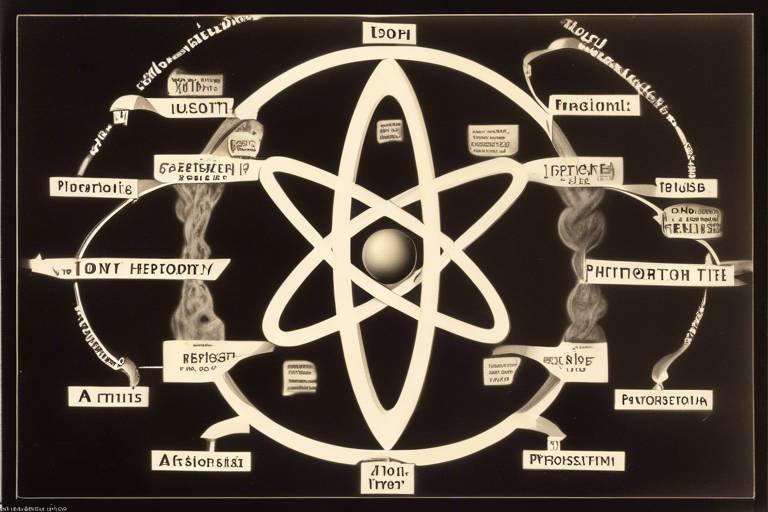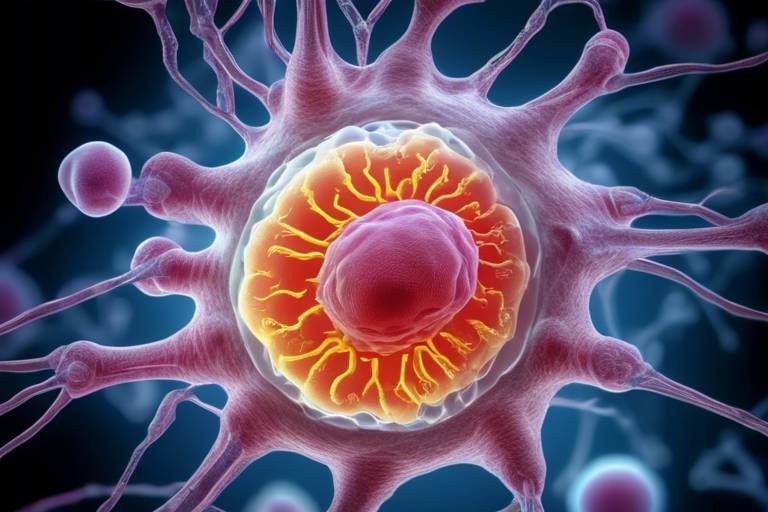What Role Does Philosophy Play in Gene Therapy?
In the rapidly evolving field of gene therapy, the intersection of science and philosophy is more crucial than ever. As we delve into the possibilities of altering human genetics, we must pause and consider the profound implications of these advancements. Gene therapy is not just a technical endeavor; it raises fundamental questions about what it means to be human, the nature of consent, and the ethical boundaries of medical intervention. So, what role does philosophy play in this complex landscape? It serves as a guiding light, illuminating the paths we tread as we explore the potential of genetic modification.
At its core, philosophy challenges us to reflect on our values and the consequences of our actions. In the context of gene therapy, this means examining the ethical ramifications of altering the genetic makeup of individuals, and by extension, entire populations. Are we playing God when we modify genes? Is it justifiable to enhance human capabilities, or should we focus solely on treating diseases? These questions aren't merely academic; they have real-world implications for patients, healthcare providers, and society at large.
Philosophy also provides the frameworks through which we can analyze the ethical dilemmas posed by gene therapy. For instance, the principles of utilitarianism advocate for actions that promote the greatest good for the greatest number. This perspective can be compelling in discussions about the benefits of gene therapy for public health, but it can also lead to contentious debates about whose interests are prioritized. Are we willing to accept potential risks to a minority if it means significant benefits for the majority? This is where philosophical inquiry becomes essential, as it helps us navigate the murky waters of ethics and public policy.
Moreover, the implications of gene therapy extend beyond individual cases. They touch on broader societal issues such as social justice and equity. For example, who gets access to these groundbreaking treatments? If only a select few can afford gene therapy, we risk exacerbating existing inequalities in healthcare. Here, philosophy prompts us to consider our moral obligations to ensure fair access to medical advancements. Shouldn't everyone have the right to benefit from the latest scientific breakthroughs, regardless of their socioeconomic status?
As we venture further into the realm of genetic modification, new philosophical debates will inevitably arise. The rapid pace of technological advancement in gene therapy means that our understanding of ethics must also evolve. We must remain vigilant and open to questioning our assumptions as we grapple with the profound implications of our choices. Philosophy, in this sense, is not just a theoretical exercise; it is a vital tool for ensuring that we approach gene therapy with the caution and responsibility it demands.
In conclusion, the role of philosophy in gene therapy cannot be overstated. It shapes our understanding of the ethical considerations, societal impacts, and future implications of genetic modification. As we stand on the brink of a new era in medicine, let us carry the lessons of philosophy with us, ensuring that our pursuit of knowledge and innovation is guided by a deep sense of ethics and responsibility.
- What is gene therapy? - Gene therapy is a technique that modifies a person's genes to treat or prevent disease.
- Why is philosophy important in gene therapy? - Philosophy helps us navigate the ethical implications and societal impacts of genetic modifications.
- What are the ethical concerns surrounding gene therapy? - Ethical concerns include issues of consent, access, and the potential for genetic discrimination.
- How does utilitarianism relate to gene therapy? - Utilitarianism evaluates the benefits and harms of gene therapy, focusing on the greatest good for the greatest number.
- What future debates might arise in gene therapy? - Future debates may focus on emerging technologies, ethical boundaries, and access to treatments.

Ethical Considerations in Gene Therapy
When we dive into the world of gene therapy, we quickly realize that it's not just about the science; it's about the ethical implications that come along with it. Imagine having the power to alter the very fabric of life, to change not just individual destinies but potentially the course of humanity itself. This power raises profound questions: What are the moral obligations of scientists and practitioners? How do we ensure that consent is informed and voluntary? These questions are not trivial; they are at the heart of the ongoing debate surrounding gene therapy.
One of the most pressing ethical dilemmas is the issue of informed consent. Patients must fully understand the risks and benefits of gene therapy before undergoing treatment. However, the complexity of genetic science can make it difficult for non-experts to grasp the implications of their choices. This leads us to ponder: How can we ensure that patients are genuinely informed? It's essential for healthcare providers to communicate clearly and effectively, breaking down complex concepts into understandable terms.
Moreover, gene therapy has the potential to create new forms of discrimination. If certain genetic traits are deemed 'desirable,' could we see a future where individuals with less favorable genetics are marginalized? This isn't just a theoretical concern; it's a real possibility that could lead to a genetic divide in society. The idea that access to gene therapy might be influenced by socioeconomic status raises ethical red flags. Who gets to benefit from these advancements? Will it be the wealthy, leaving the underprivileged behind?
Another critical ethical consideration is the moral implications of altering human genetics. Are we playing God by making these changes? This question taps into deep philosophical roots and challenges our understanding of what it means to be human. Some argue that gene therapy could lead to 'designer babies,' where parents choose traits for their children, thus commodifying human life. This raises the question: Is it ethical to impose our preferences on future generations?
As we navigate these ethical waters, it's crucial to have a framework that guides our decisions. Bioethics serves as a guiding light in this complex landscape, helping us balance the potential benefits of gene therapy with the ethical concerns it raises. By examining the principles of bioethics, we can better understand how to approach gene therapy responsibly and ethically.
In summary, the ethical considerations surrounding gene therapy are multifaceted and complex. From informed consent to the potential for discrimination and the moral implications of genetic modification, these issues demand careful thought and dialogue. As we continue to advance in this field, it is imperative that we engage in ongoing discussions about the ethical frameworks that should guide our actions in gene therapy.
- What is gene therapy? Gene therapy is a medical intervention that involves altering the genes inside a person's cells to treat or prevent disease.
- What are the ethical concerns surrounding gene therapy? Ethical concerns include informed consent, potential discrimination, and the moral implications of altering human genetics.
- How can informed consent be ensured? Healthcare providers must communicate clearly and effectively, ensuring that patients understand the risks and benefits of gene therapy.
- Could gene therapy lead to inequality? Yes, disparities in access to gene therapy could create a genetic divide based on socioeconomic status.
- What role does bioethics play in gene therapy? Bioethics provides a framework for addressing the ethical concerns that arise in the context of gene therapy.

The Philosophical Foundations of Genetic Modification
This article explores the intersection of philosophy and gene therapy, examining ethical considerations, the implications of genetic modification, and the philosophical debates that shape our understanding of this rapidly advancing field.
Ethics is a critical aspect of gene therapy, raising questions about consent, the potential for discrimination, and the moral implications of altering human genetics. This section delves into these pressing ethical dilemmas.
Understanding the philosophical underpinnings of genetic modification is crucial for framing the discussion around gene therapy. Philosophy provides us with the tools to analyze and question the implications of altering the very fabric of life. At its core, the debate revolves around what it means to be human and how far we are willing to go in our quest for improvement and innovation.
Various philosophical theories inform our views on genetic interventions, each offering a unique lens through which to scrutinize the ethical landscape of gene therapy. For instance, utilitarianism argues for the greatest good for the greatest number, while deontological ethics emphasizes the importance of moral rules and duties. These differing perspectives can lead to vastly different conclusions about the appropriateness of gene therapy practices.
Utilitarianism plays a significant role in discussions about gene therapy. Proponents may argue that if gene therapy can alleviate suffering or enhance human capabilities, it should be pursued for the overall benefit of society. However, this raises questions: Is it ethical to prioritize the needs of the many over the rights of the few? Can we justify potential risks to individuals in the name of collective good?
Consequentialism, closely related to utilitarianism, focuses on the outcomes of actions. When applying this philosophy to gene therapy, we must consider not only the immediate effects but also the long-term consequences. For example, if a gene therapy treatment leads to unforeseen genetic mutations, the initial benefits could be overshadowed by harmful repercussions. Evaluating the risks versus rewards becomes essential in this context.
On the other hand, deontological ethics centers on rules and duties, positing that certain actions are inherently right or wrong, regardless of their outcomes. This perspective might oppose gene therapy on the grounds that manipulating human genetics violates a moral duty to preserve the natural order. Advocates of this view may argue that we have a responsibility to respect the integrity of human life, suggesting that some lines should never be crossed.
Bioethics plays a vital role in shaping public policy regarding gene therapy. The intersection of philosophy and legislation is where the rubber meets the road. As society grapples with the implications of genetic technologies, philosophical debates inform the creation of laws and regulations that govern their use. Policymakers must consider the ethical ramifications of gene therapy, balancing innovation with moral responsibility.
Gene therapy's societal impact extends beyond individual cases, influencing public health, social justice, and equity. This section investigates the broader implications of gene therapy for society as a whole.
Access to gene therapy raises concerns about inequality. This subsection explores how disparities in healthcare access can affect who benefits from advancements in gene therapy and the ethical ramifications of such inequalities.
As gene therapy evolves, new philosophical questions will arise. This section anticipates future debates, focusing on emerging technologies and their potential to reshape our understanding of ethics in genetics.
- What is gene therapy? Gene therapy is a medical technique that involves altering the genes inside a person's cells to treat or prevent disease.
- What ethical concerns are associated with gene therapy? Ethical concerns include issues of consent, potential discrimination, and the moral implications of altering human genetics.
- How does philosophy influence public policy on gene therapy? Philosophy shapes the ethical frameworks that guide policymakers in creating laws and regulations surrounding genetic technologies.
- What are the potential societal impacts of gene therapy? Gene therapy can influence public health, social justice, and equity, raising questions about access and inequality.

Utilitarianism and Gene Therapy
When we talk about utilitarianism in the context of gene therapy, we're diving into a fascinating philosophical realm where the primary focus is on the outcomes of our actions. Utilitarianism, at its core, is about maximizing happiness and minimizing suffering for the greatest number of people. This principle can be both a guiding light and a source of contention in discussions surrounding gene therapy. Imagine a world where a single gene modification could eliminate a hereditary disease for thousands of individuals. Wouldn't you agree that the benefits of such an intervention could far outweigh the risks?
However, the application of utilitarian principles to gene therapy isn't as straightforward as it may seem. For instance, while the potential to cure genetic disorders is an admirable goal, we must also consider the ethical dilemmas that arise. Are we prepared to accept the trade-offs? Are there risks involved that could lead to greater harm? To illustrate this, let's consider a few scenarios:
| Scenario | Potential Benefit | Potential Risk |
|---|---|---|
| Gene therapy for Cystic Fibrosis | Elimination of a debilitating disease | Possible unforeseen genetic mutations |
| Enhancement of physical abilities | Improved quality of life and competition | Widening the gap between socio-economic classes |
| Eradicating genetic predispositions to mental health issues | Reduction in societal burden | Loss of diversity in human experiences |
These scenarios highlight a critical aspect of utilitarianism: the balance between potential benefits and risks. While the idea of using gene therapy to eradicate genetic diseases is appealing, it raises questions about whether we are truly considering the greater good. Are we merely chasing the next scientific breakthrough without fully understanding the implications?
Moreover, utilitarianism compels us to think about who gets to access these advancements. If only a select few can afford gene therapy, are we genuinely maximizing happiness? This leads us to ponder the ethical ramifications of inequality in healthcare access. The disparity in who benefits from gene therapy could inadvertently create a two-tiered society, where only the wealthy can afford life-altering treatments. In this light, utilitarianism may challenge us to rethink our approach to gene therapy and advocate for policies that ensure equitable access.
In conclusion, while utilitarianism offers a valuable framework for evaluating the potential impacts of gene therapy, it also invites us to engage in deeper ethical discussions. As we navigate the complexities of genetic modification, we must ask ourselves: Are we truly acting in the best interests of society as a whole? The answers to these questions will shape the future of gene therapy and its role in our lives.
- What is utilitarianism? Utilitarianism is a philosophical theory that advocates for actions that maximize happiness and minimize suffering for the greatest number of people.
- How does utilitarianism apply to gene therapy? Utilitarianism helps evaluate the benefits and risks of gene therapy, focusing on the overall good it can bring to society.
- What are the ethical concerns related to gene therapy? Ethical concerns include issues of consent, inequality in access, and the potential for unforeseen consequences.

Consequentialism in Genetic Interventions
When we dive into the realm of gene therapy, one of the most compelling philosophical frameworks we encounter is consequentialism. This ethical theory posits that the morality of an action is determined by its outcomes. In the context of genetic interventions, this means that the potential benefits or harms resulting from altering an individual's genetic makeup must be carefully weighed. Are we, as a society, prepared to embrace the changes that gene therapy can bring, and what consequences might arise from our decisions?
Consider the implications of gene therapy on hereditary diseases. For instance, if a gene therapy treatment can effectively eliminate a genetic disorder that affects thousands, a consequentialist perspective would argue in favor of its use. The anticipated outcome—improved health and quality of life for many—aligns with the principle of maximizing the greater good. However, this perspective also raises significant questions: What if the therapy leads to unintended side effects or long-term health issues? How do we balance the immediate benefits against potential future harms?
Moreover, consequentialism invites us to consider not just the individual impacts but also the broader societal effects of genetic interventions. For example, if gene therapy becomes widely accessible, it could lead to a significant reduction in genetic disorders, enhancing public health overall. However, if access is limited to certain populations, we might witness a widening of the health gap between different socio-economic groups. This disparity raises ethical concerns regarding equity and justice, which are critical when evaluating the consequences of gene therapy.
In the table below, we summarize some of the potential outcomes of gene therapy from a consequentialist viewpoint:
| Outcome | Positive Consequences | Negative Consequences |
|---|---|---|
| Elimination of Genetic Disorders | Improved quality of life, reduced healthcare costs | Possible unforeseen health risks |
| Access Inequality | Advancements in medical technology | Widening health disparities |
| Long-term Genetic Changes | Potential eradication of hereditary diseases | Ethical dilemmas regarding 'designer babies' |
As we navigate these complex waters, it becomes clear that a purely consequentialist approach may not be sufficient. While the focus on outcomes is crucial, it is equally important to integrate other ethical considerations, such as deontological ethics, which emphasizes duties and moral rules. By synthesizing these ethical frameworks, we can develop a more holistic understanding of the implications of gene therapy.
In conclusion, consequentialism provides a valuable lens through which to examine the ethical landscape of genetic interventions. It compels us to consider the potential benefits and harms that gene therapy may bring, both at an individual and societal level. Ultimately, the challenge lies in finding a balance—ensuring that the positive outcomes are maximized while minimizing any adverse effects that might arise from our interventions in the human genome.
- What is gene therapy? Gene therapy is a medical technique that modifies a person's genes to treat or prevent disease.
- What are the ethical concerns surrounding gene therapy? Ethical concerns include issues of consent, potential discrimination, and the long-term effects of genetic modifications.
- How does consequentialism apply to gene therapy? Consequentialism evaluates the morality of gene therapy based on its outcomes, weighing potential benefits against possible harms.
- What role does access play in the ethics of gene therapy? Access to gene therapy raises concerns about inequality, as not everyone may have the same opportunities to benefit from these advancements.

Deontological Ethics and Gene Therapy
When we dive into the realm of gene therapy, the ethical considerations can often feel like navigating a minefield. One of the most compelling frameworks for understanding these dilemmas is deontological ethics, which focuses on the morality of actions themselves rather than their outcomes. This ethical perspective is rooted in the idea that certain actions are inherently right or wrong, regardless of the consequences they produce. For instance, when discussing gene therapy, one might ask: is it morally acceptable to alter a human's genetic makeup, even if it could potentially lead to positive health outcomes?
Deontologists argue that we have moral obligations that must be respected, which can sometimes conflict with the utilitarian view that seeks the greatest good for the greatest number. For example, while gene therapy may promise to eradicate genetic diseases, it also raises questions about the sanctity of human life and the potential for unintended consequences. If we alter genes to eliminate a disease, are we also playing God? This philosophical debate is not just academic; it has real-world implications for how we approach medical ethics and patient care.
Moreover, deontological ethics emphasizes the importance of consent and autonomy. In the context of gene therapy, this translates to the necessity of obtaining informed consent from patients or their guardians. Imagine a scenario where a child is treated with gene therapy without their consent or understanding; this would raise serious ethical concerns. The deontological framework insists that individuals must be treated as ends in themselves, not merely as means to an end. This perspective compels us to consider the rights of individuals in the face of potentially life-altering medical interventions.
Another critical aspect of deontological ethics in gene therapy is the concept of justice. It prompts us to ask whether it is fair to offer certain gene therapies only to those who can afford them. If gene therapy becomes a privilege of the wealthy, we are not only perpetuating existing inequalities but also violating our moral duty to ensure equitable access to healthcare. Thus, the deontological approach challenges us to consider our responsibilities towards the broader society and the ethical implications of creating a divide between those who can and cannot access these advanced medical treatments.
In summary, deontological ethics offers a compelling lens through which to examine the complexities of gene therapy. It raises critical questions about moral obligations, consent, and justice, prompting us to reflect on what it means to act ethically in the rapidly evolving field of genetic medicine. As we continue to explore the possibilities of gene therapy, these deontological principles will remain vital in guiding our decisions and policies.
- What is deontological ethics? Deontological ethics is an ethical framework that focuses on the morality of actions themselves rather than their consequences.
- How does deontological ethics apply to gene therapy? It emphasizes moral obligations, consent, and justice, urging us to consider the rights of individuals and the ethical implications of gene therapy practices.
- Why is consent important in gene therapy? Consent is crucial as it respects the autonomy of individuals and ensures that they are fully informed about the risks and benefits of the treatment.
- What are the ethical concerns regarding access to gene therapy? There are significant concerns about equity and justice, particularly if only the wealthy can afford such treatments, potentially perpetuating health disparities.

Bioethics and Public Policy
When we think about gene therapy, it’s not just about the science or the technology; it’s also about the ethical frameworks that guide how we use these powerful tools. Bioethics plays a crucial role in shaping public policy regarding gene therapy. This field of study helps to navigate the complex moral landscape that emerges when scientific advancements intersect with societal values. As we explore the implications of gene therapy, it’s essential to understand how bioethics informs legislation and regulatory frameworks, ensuring that the benefits of these technologies are accessible while minimizing potential harms.
One of the key aspects of bioethics in the context of gene therapy is the principle of informed consent. Patients must be fully aware of the risks and benefits associated with gene therapy before they agree to undergo treatment. This process is not merely a formality; it is a fundamental ethical obligation. The challenge lies in ensuring that patients truly understand the complex scientific concepts involved. For instance, when discussing the potential for unintended genetic changes, it’s vital to communicate these risks clearly and transparently. If patients are not adequately informed, the ethical foundation of consent crumbles, leading to potential exploitation or harm.
Moreover, bioethics also addresses issues of equity and justice in access to gene therapies. As these technologies advance, there is a risk that they could become available only to those who can afford them, exacerbating existing healthcare disparities. Policymakers must grapple with questions like: How can we ensure that all individuals, regardless of socioeconomic status, have access to potentially life-saving treatments? To tackle these challenges, bioethical considerations must be integrated into public health policies. This might involve creating frameworks that prioritize equitable access or funding programs that support underprivileged populations in receiving gene therapy.
Another significant aspect of bioethics is the regulation of genetic technologies. The rapid pace of advancements in gene therapy often outstrips the ability of regulatory bodies to keep up. This creates a pressing need for bioethical oversight to ensure that new therapies are not only effective but also safe and ethically sound. Policymakers must consider how to balance innovation with caution, ensuring that the pursuit of scientific progress does not come at the expense of public safety or ethical standards. This balancing act is a delicate one, as it requires ongoing dialogue between scientists, ethicists, and lawmakers.
As we look to the future, it’s clear that the relationship between bioethics and public policy will continue to evolve. New technologies, such as CRISPR and other gene-editing tools, will undoubtedly raise fresh ethical questions. Policymakers must remain vigilant and adaptable, ready to engage with the philosophical debates that will shape the landscape of gene therapy. By fostering a culture of ethical inquiry and open dialogue, we can ensure that the benefits of gene therapy are realized while upholding the values that define our society.

Social Implications of Gene Therapy
Gene therapy is not just a groundbreaking scientific advancement; it carries profound social implications that echo through communities and healthcare systems. As we stand on the brink of a new era in medicine, it’s crucial to consider how these innovations affect society as a whole. One of the most pressing concerns is the impact on public health. As gene therapy becomes more accessible, will we see a significant improvement in health outcomes for various populations, or will disparities deepen?
Access to gene therapy is a double-edged sword. It holds the promise of curing genetic disorders and enhancing quality of life, yet it also raises questions about equity. For instance, wealthier individuals or those in developed nations may gain access to advanced treatments faster than those in lower-income brackets or developing countries. This creates a scenario where the rich get richer in terms of health, while the disadvantaged may continue to suffer from preventable conditions. The ethical ramifications of such inequalities are staggering and demand our attention.
Moreover, the societal implications of gene therapy extend into the realm of social justice. If we consider gene therapy as a privilege rather than a right, we risk entrenching existing inequalities. The potential for a two-tiered healthcare system, where only a select few can afford life-changing treatments, is a reality that we must confront. This situation could lead to a society where access to health is determined by economic status rather than need. It’s a slippery slope, and the philosophical debates surrounding this issue are just beginning.
As we navigate these complex waters, we must also consider the role of public policy. Legislation surrounding gene therapy is still in its infancy, and how we choose to regulate these technologies will have lasting effects on their distribution and accessibility. Policymakers must engage with bioethicists and the public to ensure that the benefits of gene therapy are shared equitably. This dialogue is essential for creating a framework that prioritizes human rights and social good over profit and privilege.
In summary, the social implications of gene therapy are vast and multifaceted. As we look to the future, we must ask ourselves: how can we ensure that these advancements benefit all members of society? The answer lies in a commitment to equity, justice, and ongoing philosophical discourse that challenges us to think critically about the role of technology in our lives.
- What is gene therapy? Gene therapy is a technique that modifies a person's genes to treat or prevent disease.
- How does gene therapy affect public health? It has the potential to improve health outcomes but may also exacerbate existing healthcare disparities.
- What are the ethical concerns associated with gene therapy? Key concerns include access to treatment, consent, and the implications of genetic modification.
- How can we ensure equitable access to gene therapy? Through thoughtful public policy and engagement with bioethics to address disparities in healthcare access.

Access and Inequality
Access to gene therapy is not just a matter of scientific advancement; it intertwines deeply with issues of social justice and equity. As we stand on the brink of revolutionary breakthroughs in genetics, we must ask ourselves: who truly benefits from these advancements? The reality is that disparities in healthcare access can create a significant divide, leading to a situation where only a select few can afford or access these cutting-edge treatments. This raises a host of ethical questions that we cannot ignore.
Consider the following factors that contribute to access and inequality in gene therapy:
- Economic Barriers: The high cost of gene therapy treatments often places them beyond the reach of many patients, particularly those from lower socioeconomic backgrounds. With prices sometimes soaring into the hundreds of thousands of dollars, financial constraints can dictate who receives life-saving therapies.
- Geographical Disparities: Access to specialized medical facilities that offer gene therapy is often limited to urban areas. Rural populations may find themselves without the necessary resources or specialists to provide these innovative treatments.
- Insurance Coverage: Many insurance plans do not cover gene therapy, viewing it as experimental or too costly. This lack of coverage can leave patients in a lurch, forcing them to choose between financial ruin and forgoing potentially life-altering treatments.
As we navigate these challenges, it's crucial to advocate for policies that promote equitable access to gene therapy. This could involve:
- Implementing regulations that require insurance companies to cover gene therapy treatments.
- Increasing funding for research aimed at making gene therapies more affordable.
- Creating programs that ensure healthcare facilities in underserved areas can offer these advanced treatments.
Ultimately, the conversation surrounding gene therapy must include a commitment to social equity. If we allow access to be dictated by wealth or geography, we risk creating a two-tiered healthcare system where only the privileged few can benefit from the marvels of modern science. As gene therapy continues to evolve, it is our collective responsibility to ensure that its benefits are shared broadly across society, rather than being hoarded by a select elite.
- What is gene therapy? Gene therapy is a medical technique that modifies a person's genes to treat or prevent disease.
- How does access to gene therapy vary? Access can vary significantly based on economic status, geographic location, and insurance coverage.
- What are the ethical implications of unequal access? Unequal access raises concerns about social justice and equity in healthcare, potentially leading to a divide where only the wealthy benefit from advanced treatments.
- What can be done to improve access? Advocating for policy changes, increasing funding for affordable treatments, and ensuring coverage by insurance companies are crucial steps.

Future Philosophical Debates
The landscape of gene therapy is evolving at a breakneck pace, and with it, the philosophical debates surrounding it are bound to intensify. As we stand on the brink of a new era in genetic modification, questions about the ethical implications, societal impacts, and the very nature of humanity are becoming more pressing. What happens when we can alter not just disease susceptibility but also traits like intelligence, physical ability, or even emotional predispositions? This opens a Pandora's box of ethical considerations that society must grapple with.
One of the most intriguing aspects of future philosophical debates will likely revolve around the concept of designer babies. As technology advances, the ability to select genetic traits could become commonplace. This raises significant questions: Should parents have the right to choose their child's traits? What are the potential societal implications of creating a generation of genetically modified individuals? The line between therapeutic interventions and enhancements will blur, leading to profound discussions about what it means to be human.
Moreover, the ethical landscape surrounding gene therapy will also need to address the potential for misuse. With the rise of CRISPR and other gene-editing technologies, the possibility of creating biological weapons or enhancing human capabilities for competitive advantage could lead to ethical dilemmas that challenge our moral framework. Will we see a future where genetic modifications create a divide between the "enhanced" and the "natural"? If so, how will society address the potential for discrimination based on genetic traits?
Furthermore, as gene therapy becomes more accessible, we must consider the global implications. Different cultures and societies may have varying beliefs about genetic modification. This raises the question of whether a universal ethical framework can be established or if we will see a patchwork of regulations and beliefs that complicate global health initiatives. The potential for unequal access to gene therapy could exacerbate existing health disparities, leading to further philosophical debates about justice and equity in healthcare.
As we look to the future, it’s essential to engage in ongoing dialogues about these issues. Philosophers, ethicists, scientists, and the public must come together to navigate the complex terrain of gene therapy. The conversations we have today will shape the policies and practices of tomorrow. To facilitate this, we might consider establishing forums or discussion groups dedicated to exploring these philosophical questions, ensuring that a diverse range of voices is heard.
In conclusion, the future of gene therapy is not just a scientific frontier but a philosophical one as well. As we push the boundaries of what is possible, we must also reflect on the implications of our choices and strive for a future that respects both individual rights and the collective good.
- What is gene therapy? Gene therapy is a technique that modifies a person's genes to treat or prevent disease.
- What are the ethical concerns surrounding gene therapy? Ethical concerns include issues of consent, potential discrimination, and the moral implications of altering human genetics.
- How could gene therapy affect social inequality? Access to gene therapy may be limited by socioeconomic factors, potentially widening the gap between those who can afford it and those who cannot.
- What future debates might arise from advancements in gene therapy? Future debates may focus on designer babies, genetic enhancement, global access, and the ethical implications of genetic modifications.
Frequently Asked Questions
- What is gene therapy?
Gene therapy is a medical technique that involves altering the genes inside a person's cells to treat or prevent disease. By correcting defective genes or introducing new ones, it aims to address the root causes of genetic disorders.
- What ethical concerns are associated with gene therapy?
Ethical concerns surrounding gene therapy include issues of consent, potential discrimination based on genetic information, and the moral implications of altering human genetics. These dilemmas raise questions about who should have access to these technologies and the potential for misuse.
- How does philosophy influence gene therapy discussions?
Philosophy plays a crucial role in shaping the discourse around gene therapy by providing frameworks for ethical analysis. Philosophical theories such as utilitarianism and deontological ethics help us evaluate the moral implications and societal impacts of genetic modifications.
- What is utilitarianism, and how does it relate to gene therapy?
Utilitarianism is a philosophical theory that advocates for actions that maximize overall happiness or well-being. In the context of gene therapy, this perspective can justify certain interventions if they are believed to benefit the majority, but it also raises questions about the rights of individuals.
- What are the social implications of gene therapy?
Gene therapy can have significant social implications, including issues of access and inequality. Disparities in healthcare can lead to unequal opportunities for individuals to benefit from advancements in genetic technologies, raising ethical concerns about fairness and justice.
- What future philosophical debates might arise from advancements in gene therapy?
As gene therapy continues to evolve, new philosophical questions will emerge, particularly regarding emerging technologies and their ethical implications. Debates may focus on the limits of genetic modification, the definition of 'normalcy,' and the potential for unforeseen consequences.



















